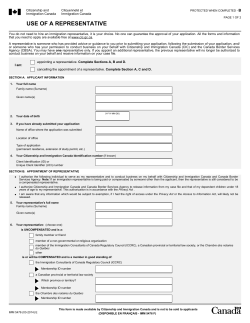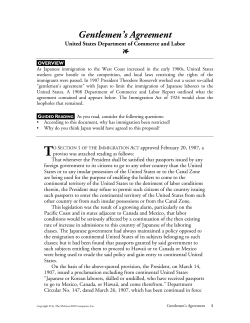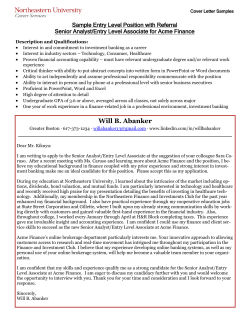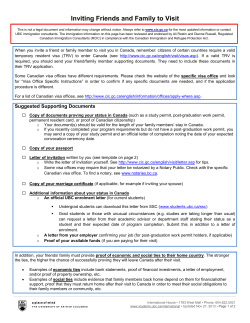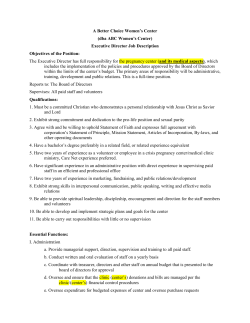
28 May 2012 The President The White House 1600 Pennsylvania Avenue, N.W.
28 May 2012 The President The White House 1600 Pennsylvania Avenue, N.W. Washington, D.C. 20500 re: Executive authority to grant administrative relief for DREAM Act beneficiaries Dear Mr. President, We write as law professors whose teaching and scholarship focus on matters of U.S. immigration and citizenship law. This letter addresses an issue that may arise as agencies and officials within the Executive Branch consider various administrative options in cases involving potential beneficiaries of the Development, Relief, and Education for Alien Minors (DREAM) Act. In assessing the options that may be available to the Executive Branch, the threshold question is whether there is executive authority to grant administrative relief. This is the question addressed in this letter. Though your Administration has considered various forms of prosecutorial discretion for individual DREAM-eligible applicants, this letter highlights the administrative authority that is available to potential DREAM Act beneficiaries as a group. We offer no views on the policy dimensions of a decision to exercise or to not exercise this authority. We write only to explain that there is clear executive authority for several forms of administrative relief for DREAM Act beneficiaries: deferred action, parole–in–place, and deferred enforced departure. Deferred action is a long–standing form of administrative relief, originally known as “nonpriority enforcement status.” 1 It is one of many forms of prosecutorial discretion available to the Executive Branch. A grant of deferred action can have any of several effects, depending on the timing of the grant. It can prevent an individual from being placed in removal proceedings, suspend any proceedings that have commenced, or stay the enforcement of any existing removal order. 2 It also makes the recipient eligible to apply 1 See generally T.A. Aleinikoff, David A. Martin, Hiroshi Motomura, and Maryellen Fullerton, Immigration and Citizenship: Process and Policy 780 (7th ed. 2012); Shoba Sivaprasad Wadhia, The Role of Prosecutorial Discretion in Immigration Law, 9 Conn. Pub. Int. L.J. 243, 248-65 (2010). 2 Practitioners have reported that, in recent months, some DHS officials have taken the position that deferred action is available only to individuals who are in removal proceedings. At the same time, these officials maintain that once a removal case has been administratively closed, deferred action is no longer available. This position is inconsistent with DHS’s prior practice. See Citizenship and Immigration Services re: Executive authority to grant administrative relief for DREAM Act beneficiaries page 2 for employment authorization. 3 General authority for deferred action exists under Immigration and Nationality Act (INA) § 103(a), 8 U.S.C. § 1103(a), which grants the Secretary of Homeland Security the authority to enforce the immigration laws. Though no statutes or regulations delineate deferred action in specific terms, the U.S. Supreme Court has made clear that decisions to initiate or terminate enforcement proceedings fall squarely within the authority of the Executive. 4 In the immigration context, the Executive Branch has exercised its general enforcement authority to grant deferred action since at least 1971. Federal courts have acknowledged the existence of this executive power at least as far back as the mid–1970s. 5 More recently, this Administration granted deferred action in June 2009 to widows and children of U.S. citizens while legislation to grant them statutory relief was under consideration. 6 Parole–in–place refers to a form of parole granted by the Executive Branch under the authority of INA § 212(d)(5), 8 U.S.C. § 1182(d)(5). Under this provision, the Attorney General “may . . . in his discretion parole into the United States temporarily under such conditions as he may prescribe only on a case–by–case basis for urgent humanitarian reasons or significant public benefit any alien applying for admission to the United States.” 7 Parole permits a noncitizen to remain lawfully in the United States, although parole does not constitute an “admission” under the INA. Individuals who have been paroled are eligible for work authorization. 8 Under this express authority, previous Presidents have granted parole to noncitizens who did not qualify for admission under existing immigration law. For example, President Jimmy Carter exercised parole authority Ombudsman, Deferred Action: Recommendations to Improve Transparency and Consistency in the USCIS Process, July 11, 2011, at 3-4; Citizenship and Immigration Services, Fact Sheet: USCIS Provides Interim Deferred Action Relief for Surviving Spouses, Aug. 31, 2009. It is also inconsistent with case law and with DHS’s own regulations. As the Supreme Court has explained, through deferred action: “[T]he INS may decline to institute proceedings, terminate proceedings, or decline to execute a final order of deportation. . . . A case may be selected for deferred action treatment at any stage of the administrative process.” Reno v. American-Arab Anti-Discrimination Committee, 525 U.S. 471, 483-84 (1999) (quoting 6 C. Gordon, S. Mailman, & S. Yale-Loehr, Immigration Law and Procedure §72.03[2][h] (1998)) (quotation marks removed) (emphasis added); see also 8 C.F.R. § 274a.12(c)(14) (describing deferred action as “an act of administrative convenience to the government which gives some cases lower priority”). 3 See 8 C.F.R. § 274a.12(c)(14). 4 See, e.g., Heckler v. Chaney, 470 U.S. 821, 831 (1985). 5 See, e.g., Soon Bok Yoon v. INS, 538 F.2d 1211, 1213 (5th Cir. 1976); Vergel v. INS, 536 F.2d 755, 757-58 (8th Cir. 1976); David v. INS, 548 F.2d 219, 223 & n.5 (8th Cir. 1977); Nicholas v. INS, 590 F.2d 802, 806-08 (9th Cir. 1979), superseded by rule on other grounds, as stated in Romeiro de Silva v. Smith, 773 F.2d 1021, 1024 (9th Cir. 1985). 6 See DHS Establishes Interim Relief for Widows of U.S. Citizens, June 9, 2009, available at http://www.dhs.gov/ynews/releases/pr_1244578412501.shtm. 7 Although the INA gives the parole authority to the Attorney General, the statutes creating DHS in 2003 essentially transferred the parole–granting authority to DHS. 8 8 C.F.R. § 274a.12(c)(11). re: Executive authority to grant administrative relief for DREAM Act beneficiaries page 3 to allow Cubans into the United States in 1980. 9 President Bill Clinton did the same in 1994. 10 More recently, this Administration granted parole in January 2010 to Haitian orphans who were in the process of being adopted by U.S. citizens. 11 In May 2010, this Administration adopted the current practice of granting parole to spouses, parents, and children of U.S. citizens serving in the military. 12 Though the text of the statute calls for case–by–case discretion, both historical and current practice make clear that such discretionary judgments may be based on group circumstances. 13 And, as the Supreme Court has made plain, the Administration’s use of group circumstances as a basis for decision–making would be entitled to deference. 14 Deferred enforced departure, often referred to as DED, is a form of prosecutorial discretion that is closely related to deferred action. Almost every Administration since President Dwight D. Eisenhower has granted DED or the analogous “Extended Voluntary Departure” to at least one group of noncitizens. 15 As with deferred action, executive authority to grant deferred enforced departure and extended voluntary departure exists under the general authority to enforce the immigration laws as set out in INA § 103(a), 8 U.S.C. § 1103(a). 16 Though Temporary Protected Status (TPS) in INA § 244, 8 U.S.C. § 1254a, has largely superseded the use of DED in practice, DHS’s statutory authority for granting DED on bases other than nationality remains intact, and the President retains his inherent authority with respect to DED. Most recently, this Administration granted DED to Liberians in March 2009. 17 Though DED has been used in response to disturbed conditions in specific countries, there is nothing in the statutory authority for DED that limits its use to such situations. Recipients of DED are eligible to apply for work authorization. 18 9 See T.A. Aleinikoff, David A. Martin, Hiroshi Motomura, and Maryellen Fullerton, Immigration and Citizenship: Process and Policy 520 (7th ed. 2012). 10 See id. 11 See Secretary Napolitano Announces Humanitarian Parole Policy for Certain Haitian Orphans, January 18, 2010, available at http://www.dhs.gov/ynews/releases/pr_1263861907258.shtm 12 See Julia Preston, Immigration Policy Aims to Help Military Families, N.Y. Times, August 1, 2010, at A15. 13 For a discussion of the historical use of the parole power, see, e.g., Arthur C. Helton, Immigration Parole Power: Toward Flexible Responses to Migration Emergencies, 71 Interpreter Releases 1637 (Dec. 12, 1994). For examples of more recent categorical grants of parole, see supra notes 11 and 12. 14 See generally Chevron v. Natural Resources Defense Council, 467 U.S. 837 (1984). 15 See Ari Weitzhandler, Comment, Temporary Protected Status: The Congressional Response to the Plight of Salvadoran Aliens, 64 U. Colo. L. Rev. 249, 256 & nn. 41–43 (1993). 16 Hotel and Restaurant Employees Union, Local 25 v. Smith, 846 F.2d 1499, 1510 (D.C. Cir. 1988) (en banc) (opinion of Mikva, J.), affirming by an equally divided court 594 F. Supp. 502 (D.D.C. 1984); see also American Baptist Churches in the U.S.A. v. Meese, 712 F. Supp. 756, 768 (N.D. Cal. 1989). 17 See Deferred Enforced Departure of Liberians, March 23, 2009, available at http://www.whitehouse.gov/the-press-office/presidential-memorandum-regarding-deferred-enforceddeparture-liberians 18 8 C.F.R. § 274a.12(c)(14). re: Executive authority to grant administrative relief for DREAM Act beneficiaries page 4 These three forms of administrative relief differ in their requirements and consequences. In this letter, we do not reach these questions of specific application. Our purpose in writing is more limited and straightforward: to explain that the Executive Branch has the authority to grant these three forms of administrative relief to some significant number of DREAM Act beneficiaries, and that it has done so both historically and recently in similar situations. Respectfully yours, Hiroshi Motomura Susan Westerberg Prager Professor of Law UCLA School of Law* David Abraham Professor of Law University of Miami School of Law Muneer I. Ahmad Clinical Professor of Law Yale Law School Raquel Aldana Professor of Law University of the Pacific McGeorge School of Law Deborah Anker Clinical Professor of Law Director, Harvard Immigration and Refugee Clinical Program Harvard Law School Angela M. Banks Associate Professor William & Mary School of Law * All institutional affiliations indicated for identification purposes only. Signatures continued* Melynda H. Barnhart Associate Professor New York Law School Linda Bosniak Professor of Law Rutgers University School of LawCamden Richard Boswell Professor of Law University of California, Hastings College of the Law Allison Brownell Tirres Assistant Professor DePaul University College of Law Kristina M. Campbell Assistant Professor of Law Director, Immigration and Human Rights Clinic University of the District of Columbia David A. Clarke School of Law Michael J. Churgin Raybourne Thompson Centennial Professor in Law The University of Texas at Austin Marisa S. Cianciarulo Associate Professor of Law Director, Bette & Wylie Aitken Family Violence Clinic Chapman University Adam B. Cox Professor of Law New York University School of Law Keith Cunningham-Parmeter Associate Professor of Law Willamette University College of Law Alina Das Assistant Professor of Clinical Law New York University School of Law Johanna K.P. Dennis Associate Professor of Law Southern University Law Center Stacy Caplow Professor of Law Brooklyn Law School Ingrid V. Eagly Acting Professor of Law UCLA School of Law Ming Hsu Chen Associate Professor University of Colorado Law School Jill E. Family Associate Professor of Law Widener University School of Law Gabriel J. Chin Professor of Law University of California, Davis School of Law Niels W. Frenzen Clinical Professor of Law Gould School of Law University of Southern California * Maryellen Fullerton Professor of Law Brooklyn Law School All institutional affiliations indicated for identification purposes only. re: Executive authority to grant administrative relief for DREAM Act beneficiaries page 6 Signatures continued* César Cuauhtémoc García Hernández Assistant Professor Capital University Law School Lauren Gilbert Professor of Law St. Thomas University School of Law Denise Gilman Clinical Professor Co-Director, Immigration Clinic University of Texas School of Law Jennifer Gordon Professor of Law Fordham University School of Law Pratheepan Gulasekaram Assistant Professor of Law Santa Clara University Anjum Gupta Assistant Professor of Law Director, Immigrant Rights Clinic Rutgers School of Law - Newark Jonathan Hafetz Associate Professor of Law Seton Hall University School of Law Barbara Hines Clinical Professor of Law Co-Director, Immigration Clinic University of Texas School of Law Geoffrey A. Hoffman Clinical Associate Professor and Director, University of Houston Immigration Clinic University of Houston Law Center * All institutional affiliations indicated for identification purposes only. Alan Hyde Distinguished Professor and Sidney Reitman Scholar Rutgers University School of Law Kate Jastram Lecturer in Residence Senior Fellow, Miller Institute for Global Challenges and the Law University of California, Berkeley School of Law Michael Kagan Associate Professor William S. Boyd School of Law University of Nevada, Las Vegas Daniel Kanstroom Professor of Law and Director, International Human Rights Program Boston College Law School Kathleen Kim Professor of Law Loyola Law School, Los Angeles David C. Koelsch Associate Professor and Director, Immigration Law Clinic University of Detroit Mercy School of Law Sylvia R. Lazos Justice Myron Leavitt Professor William S. Boyd School of Law University of Nevada, Las Vegas Stephen Lee Assistant Professor of Law University of California, Irvine re: Executive authority to grant administrative relief for DREAM Act beneficiaries page 7 Signatures continued* Jennifer Lee Koh Assistant Professor of Law Western State University College of Law Beth Lyon Professor of Law Villanova University School of Law Lynn Marcus Professor of the Practice Co-Director, Immigration Law Clinic University of Arizona Rogers College of Law Peter L. Markowitz Associate Clinical Professor of Law Benjamin N. Cardozo School of Law M. Isabel Medina Ferris Family Distinguished Professor of Law Loyola University New Orleans College of Law Jennifer Moore Regents Professor of Law University of New Mexico School of Law Daniel Morales Assistant Professor DePaul University College of Law Nancy Morawetz Professor of Clinical Law New York University School of Law Fatma E. Marouf Associate Professor of Law Co-Director of the Immigration Clinic William S. Boyd School of Law University of Nevada, Las Vegas Karen Musalo Clinical Professor of Law & Director, Center for Gender & Refugee Studies University of California, Hastings College of the Law Elizabeth McCormick Associate Clinical Professor of Law University of Tulsa College of Law Noah Benjamin Novogrodsky Associate Professor of Law University of Wyoming College of Law Karla McKanders Associate Professor of Law University of Tennessee, College of Law Mariela Olivares Assistant Professor of Law Howard University School of Law Michelle McKinley Associate Professor University of Oregon School of Law Michael A. Olivas William B. Bates Distinguished Chair in Law University of Houston Law Center * All institutional affiliations indicated for identification purposes only. Sarah H. Paoletti Practice Associate Professor Director, Transnational Legal Clinic University of Pennsylvania School of Law re: Executive authority to grant administrative relief for DREAM Act beneficiaries page 8 Signatures continued* Huyen Pham Professor of Law Texas Wesleyan University School of Law Polly J. Price Professor of Law Emory University School of Law Nina Rabin Associate Clinical Professor of Law Director, Bacon Immigration Law and Policy Program James E. Rogers College of Law, University of Arizona Jaya Ramji-Nogales Associate Professor of Law Temple University, Beasley School of Law Jayesh Rathod Assistant Professor of Law American University Washington College of Law Maritza Reyes Assistant Professor of Law Florida A&M University College of Law Ediberto Roman Professor of Law & Director of Citizenship and Immigration Initiatives Florida International University Victor C. Romero Maureen B. Cavanaugh Distinguished Faculty Scholar & Professor of Law The Pennsylvania State University, Dickinson School of Law Rachel E. Rosenbloom Assistant Professor Northeastern University School of Law Kevin Ruser M.S. Hevelone Professor of Law Director of Clinical Programs University of Nebraska-Lincoln College of Law Leticia M. Saucedo Professor of Law University of California, Davis School of Law Michael Scaperlanda Edwards Family Chair in Law University of Oklahoma College of Law Irene Scharf Professor of Law University of Massachusetts School of Law – Dartmouth Andrew I. Schoenholtz Visiting Professor of Law Georgetown University Law Center Philip G. Schrag Delaney Family Professor of Public Interest Law Georgetown University Law Center Rachel Settlage Assistant Professor Wayne State Law School * All institutional affiliations indicated for identification purposes only. re: Executive authority to grant administrative relief for DREAM Act beneficiaries page 9 Signatures continued* Ragini Shah Associate Clinical Professor of Law Suffolk University Law School Rebecca Sharpless Associate Clinical Professor University of Miami School of Law Dan R. Smulian Associate Professor of Clinical Law Safe Harbor Project BLS Legal Services Corporation Brooklyn Law School Gemma Solimene Clinical Associate Professor of Law Fordham University School of Law Jayashri Srikantiah Professor of Law & Director, Immigrants’ Rights Clinic Stanford Law School Juliet P. Stumpf Professor of Law Lewis & Clark Law School Maureen A. Sweeney Clinical Instructor Immigration Clinic University of Maryland Francis King Carey School of Law Margaret Taylor Professor of Law Wake Forest University School of Law * All institutional affiliations indicated for identification purposes only. David B. Thronson Professor of Law Michigan State University College of Law Enid Trucios-Haynes Professor of Law & University Faculty Grievance Officer Brandeis School of Law University of Louisville Diane Uchimiya Professor of Law Director of the Justice and Immigration Clinic University of LaVerne College of Law Katherine L. Vaughns Professor of Law University of Maryland Francis King Carey School of Law Prof. Sheila I Vélez Martínez Immigration Law Clinic University of Pittsburgh School of Law Leti Volpp Professor University of California, Berkeley School of Law Shoba Sivaprasad Wadhia, Esq. Clinical Professor and Director, Center for Immigrants’ Rights The Pennsylvania State University The Dickinson School of Law David P. Weber Associate Professor of Law Creighton Law School Jonathan Weinberg Professor of Law Wayne State University re: Executive authority to grant administrative relief for DREAM Act beneficiaries page 10 Signatures continued* Deborah M. Weissman Reef C. Ivey II Distinguished Professor of Law University of North Carolina School of Law Virgil Wiebe Professor of Law University of St. Thomas School of Law (Minneapolis) Michael Wishnie William O. Douglas Clinical Professor of Law and Director of the Jerome N. Frank Legal Services Organization Yale Law School Elizabeth L. Young Associate Professor of Law University of Arkansas School of Law – Fayetteville * All institutional affiliations indicated for identification purposes only.
© Copyright 2025
